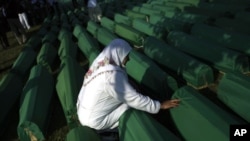An estimated 40,000 people gathered in Srebrenica, Bosnia-Herzegovina on Monday to mark the 16th anniversary of Europe's worst civilian massacre since World War II. The remains of 613 victims only recently dug up and identified were reburied as part of Monday's commemoration.
Collective Muslim prayers echoed Monday throughout the memorial center on the outskirts of Srebrenica, which already contains more than 4,500 graves.
In July 1995, Bosnian Serb forces killed about 8,000 Muslim men and boys after invading Srebrenica during the Bosnian war.
On Monday, survivors and volunteers hoisted 613 coffins wrapped in green cloth to the air and carried them to a field of freshly dug graves in the sweltering hot nearby valley.
The youngest laid to rest was just 11 years old, the oldest 82.
At the ceremony, U.S. ambassador to Bosnia Patrick Moon recalled the mass killings by forces of genocide suspect Ratko Mladic, who was recently brought to the Netherlands-based United Nations Tribunal.
“We mourn for the victims laid to rest and for those still waiting to be found," he said. "The arrest of Ratko Mladic gives us yet more reason to reflect on the horrific crimes against the innocent that took place here in Srebrenica. We remember what was done and what the world failed to do 16 years ago.”
Monday's funeral came just days after a court in the Netherlands ruled the Dutch state was responsible for the deaths of three Bosnian Muslims in the 1995 Srebrenica massacre and should compensate relatives.
It made clear that the outnumbered Dutch peacekeepers were wrong in handing the three men over to Bosnian Serb forces. Trial observers say the unexpected ruling may open the way for other compensation claims.
However, no money will be able to bring back the loved ones of the many crying women attending the commemoration.
One mourning woman said, "I have to bury many neighbors, about 30. It is so painful." Looking to the many caskets she added, "I don't know what to say."
During the ceremony, officials urged Serbs both in Bosnia and in neighboring Serbia to face the past and realize what was done in their name.
Ethnic divisions remain in the country, which was divided into a Serb entity and a Muslim-Croat federation following the war of the 1990s that killed more than 100,000 people.
On Monday, the Bosnian Serb member of the country's three-member presidency failed to attend the massive funeral and commemoration service.








